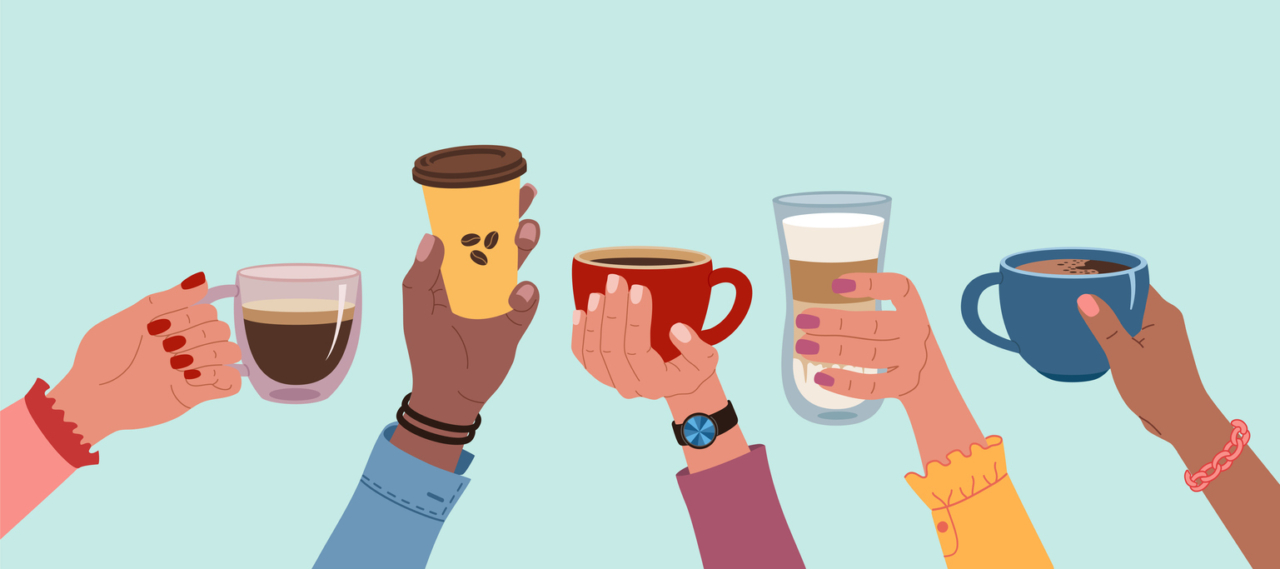
Imagine you are standing somewhere with a cup of good, hot coffee (or your favorite beverage). You are about to begin to enjoy your coffee when someone walks past you and bumps into you. The result is coffee is spilled everywhere. Why was coffee spilled? Most people would say the coffee was spilled because someone bumped into you; it is someone’s fault and not your own. We need to see that we spilled the coffee because there was coffee in our cup. Had you had tea, hot chocolate, or whatever your favorite beverage is in your cup, you would have spilled that. The point is, whatever is inside the cup is what will spill out. That seems obvious, so you might be wondering how does any of this apply to Mandt and what we do? What is the moral of this story?
We need to see that we are the coffee cup from the opening story. We fill ourselves with things of our choosing. Some people fill themselves with happiness, positive thoughts and attitudes, gratefulness, peace and humility, and caring for others. Other people choose to fill themselves with jealousy, anger, competitiveness, harsh words, contempt, and rage. What we fill ourselves with is not always a conscious choice. Some people will even say that they want to be happy, or positive, or something other than what they are, but that life just hands them bad things. They feel they just can’t catch a break. While we can not control everything we encounter in life, we can control how we view what is happening around us. How we view things will help us be positive, negative, happy, aggressive, or whatever it is with which we are filling our cup.
If we are the coffee cup, life is the person that bumps into us. When life comes along and shakes you, which happens to all of us, whatever is inside you will come out. The contents of our cup is a mix of both good and bad, happy and sad, positive and negative. When we are in control of ourselves It is easy to let the good out, to respond to others with dignity and respect. When we are stressed and/or escalated we lose that control and we get rattled. When we are rattled and our cup gets bumped, that is when we react rather than respond, and the negativity comes out. That is when someone you thought was a good person does something we wish they wouldn’t do. Because that negativity was inside of them, covered up with a layer of a really nice veneer. So, the more good in our cup and the more in control of ourselves we remain, the easier it is to respond to others with our good, our dignity and respect.
Another lesson we can learn from our cup story relates to how full or empty we keep our cup. An empty cup is easier to move or bump than a full cup. So, what can we do to help ourselves fill our cup with positives? Self care can be seen as the act of filling our cup with positives. If the level in our cup is low it is difficult to pour out much of anything for others, let alone dignity and respect. Also, if we do not work on filling our cup with positives it is easier for the negatives to fill our cup. What are each of us doing for our own self care? Some people may believe that self care is either not important or self indulgent. It is neither, it is necessary. We must work on filling our own cup with as many positives as possible.
We need to see that if we work in a culture that supports self care, we work in a positive culture. Many times, however, we work in cultures that reward the opposite of self care. Think about it, if you get more bonuses and promotions for working extra hours, shifts, or projects, with no concern from your employer about your own self care, they are rewarding negative self care. You will be used up and burned out. The organization may bemoan that you are leaving them, but they drove you to it. A positive organizational culture, however, will reward or encourage you to take care of yourself. The organization realizes it is difficult to support others if they do not support their own staff. A positive organization makes it easier to make sure your cup is full of positive things.
Some may say it is not that simple. I don’t choose to fill myself with negative thoughts, but life gives them to me. I can’t help it that my organization rewards my negative self care, but I need the money so I’m going to do it. Remember, every day we have a choice. We may choose to fill our cup with positives or negatives. We may choose to have a good day or we may choose to have a bad day. Even if we choose to have a good day, that does not mean that the world is obligated to only show us nice things. It is how we respond that determines the good or bad day. If we can remember to affirm the feeling and choose the behavior, then it is easier to treat everyone with dignity and respect, even when life bumps us.
Dr. Dale Shannon – Director of Instructional Design



